No strings on me: What the Sugar Hole puppets have learned about human nature
Published in Lifestyles
CHICAGO -- The Sugar Hole puppets are an odd bunch. Since May they have appeared every Saturday and Sunday and offered passersby cones of ice cream. When the weather turned, they began serving soup, hand pies, beer and wine. They are not pushy. They are plush. They poke their heads out of a warren on Hamlin Avenue and take orders, then retreat into their sugar hole; a few minutes later, a human being brings you food.
The Sugar Hole puppets are an experiment by Color Club, an experimental arts studio in Irving Park. They’ve been on local TV and radio and maybe you’ve seen those reports and thought they looked cute. And yeah, they are. But beneath the felt and the googly eyes, there’s a truism: When we talk to puppets, we are no longer ourselves.
“Just by making this one change in a normal everyday interaction, I’ve seen it unlock something in folks,” said Josh Dihle, who owns Color Club with his wife Abby Monroe. Little boys tend to see how far they can push a puppet’s buttons, so to speak. One adult tried to snooker a puppet out of change, only to be shamed by his girlfriend.
“The puppets become something of a Rorschach test,” Dihle said. “They nudge you out of the structured expectations we have of just ordering food, in a small way. There’s a chaotic effect a lot of the time. You don’t know if you’re talking to a male, a female, an alien…”
That’s what happened to me. My order-taker had eyes that poked like limbs. Those eyes were used to take my credit card. The puppet said its name was Puddles. I asked if they were a boy or girl or a fish or an alien or what, and the patient voice of the puppeteer asked what I thought it was. I looked at my wife and backed off slightly, mumbling to the puppet that, no, it didn’t really matter what it was, of course. I wanted a cone of vanilla soft serve, and now I felt myself being drawn into a chat about gender.
So with that in mind, I’ve since spoken to four of the Sugar Hole puppeteers about what they have learned about human nature since they began talking to people through puppets.
Camille Mitchell is Puddles. She’s studied improvisation and works by day as a Montessori teacher. She made Puddles. From children, she said, she hears a lot of questions about appearance. So she made up a backstory: Puddles is indeed an alien, from planet Florp. “But I like that question of ‘What are you supposed to be?’ Because I’m a teacher, I’m used to hearing questions about race and gender.” Depending on the person, she leans on her improv background and “whatever scraps people give me about themselves, or what they think I am, I will try to incorporate them into the chat.
“Adults ask more about the psyche of Puddles. They want to know how my day is going. I say how hard it is to find employment as a puppet. Then they open up. They had a bad day, they had a break-up. People ramble and apologize. I try to pump them up. We have a regular who lives in the neighborhood. One day he seemed off so Puddles improvised a song for him, rhyming his name. The very next day Puddles got a letter from him. He had heard some bad news about a friend and Puddles helped. I never leave this job tired and drained. I leave buoyant. It’s the healthiest work relationship I have ever had.”
Evan Thompson is Jeremiah Carburetor, cowboy ranch hand from Pennsylvania. “Which makes no sense.” Thompson is a musician, songwriter and the AV guy at Color Club. He studied voice in college. But he’s a naturally shy person. “Despite having done plenty of performances as a singer, I wish everyone could spend a day behind a puppet.” Sugar Hole puppets poke out from a curtain that obscures the puppeteer. “You are heard, not seen. It helps you let loose and inhabit a character without inhibitions.”
But it can get awkward. “Once I was talking to this woman and we had some clear chemistry. Just a light flirtation. And she said ‘What is your name?’ And I said ‘Evan!’ Then ‘Oh, wait, I mean Jeremiah Carburetor.’ But the funniest thing that happens is when someone walks up to the window — usually a man — and they order fast, down to business, like they’re not talking to a puppet. Meanwhile I’m acting goofy. I go with that, too. I’ve learned the more you inhabit the character, the more people get comfortable.”
Sophia Tarducci is Moolissa, psychedelic cow— part bovine, part giraffe. As Sugar Hole lore has it, Moolissa was abducted by Steve, her ex-boyfriend, who gave her leg enhancements. She’s now dating Jeremiah. She’s also an extension of Tarducci, who works at the Chicago International Puppet Theater Festival and wants to use puppets to explore everyday interactions and questions of queerness and femininity. She realized this as a graduate student at the School of the Art Institute of Chicago. “A lot of the performance art I was seeing was serious, and at first I wanted to be serious.” But she was struck by how open people could get talking to a puppet. Herself included. “I am relatively introverted and become more extroverted from this job. I’m uncomfortable singing alone in the car but I sing a lot here. And it sounds horrible!
“One day we had these little boys, maybe 12 or 13, messing around, trying to touch the puppet and then we heard them calling (the puppet) the ‘F’ slur. So I just told them it was a hurtful word and wrong and we removed the puppet and just didn’t serve them. I remember not being sure how to handle it, but I like how I just said my feelings and left.”
Lucy Wirtz is Steve, Moolissa’s ex-boyfriend. He’s an alien with one eye and three arms. Wirtz, who also works for the Chicago International Puppet Theater Festival, built most of the puppets at Sugar Hole. She was a theater kid who got into puppeteering during the pandemic while attending the University of California Los Angeles. “You get the kids who are scared of us, but more often you get adults who are overjoyed to see a puppet out in the real world.” As if they had stumbled onto Sesame Street itself.
“It’s also an opportunity for kids to do that very rambling storytelling thing. The expressive face of the puppet can be helpful then. People will also ask what the puppets’ pronouns are. There is that generation who approach it as ‘OK, am I supposed to ask pronouns now?’ Jeremiah has been misgendered. But coming from an improv background, I know to go with all of it. Drew, kind of our generic sock puppet, gets a lot of race questions, oddly.
“I’ve made him a California skater/surfer/potential stoner. He surfed so much he grew gills I say if someone asks if he’s amphibian. People need to put Steve in a category, and you want them to recognize a broader idea: Sometimes a puppet is just a puppet.”
©2024 Chicago Tribune. Visit at chicagotribune.com. Distributed by Tribune Content Agency, LLC.
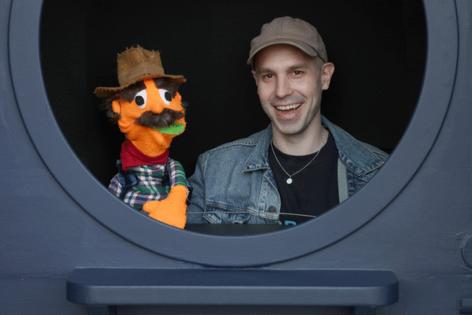
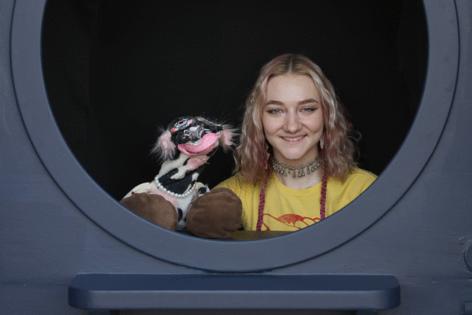
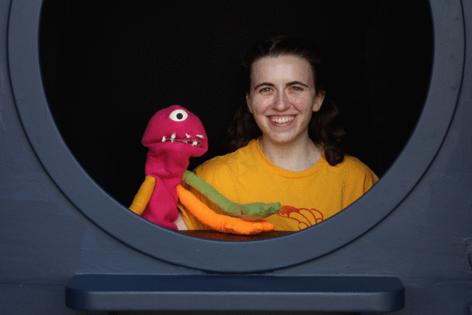
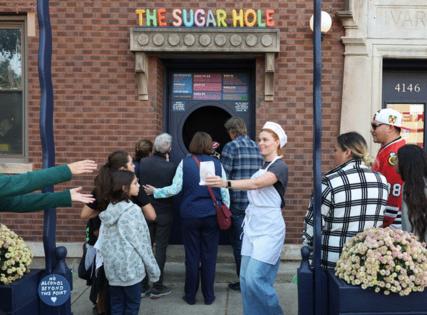
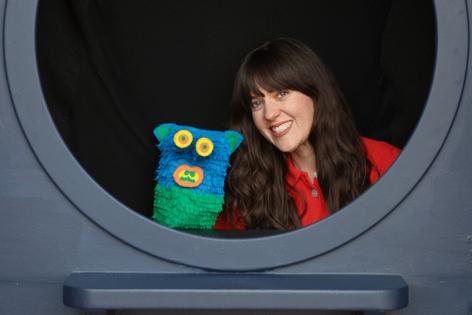




























Comments